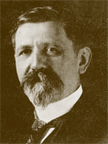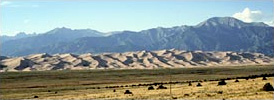Borel's Law and Creationismby Loren Cobb I recently found mention of "Borel's Law" in a discussion of intelligent design versus evolution, while browsing the "Atheist Fools" discussion board at The Motley Fool. Until today, I had never heard of this "Borel's Law," despite a long career spent as an applied mathematician. It turns out that creationists have been using an idea of Emile Borel, which they call "Borel's Law," to support their probability argument against the theory of evolution. On doing some research, it seems important enough to write an expository essay on Borel's idea, and its relevance for evolutionary biology. I hope that this essay will clarify the position of "Borel's Law" in mathematics. Here is a link to the typical way in which "Borel's Law" is invoked to prove that evolution is impossible:
And here is a link to a typical counterargument from defenders of evolution: This counter-argument is not wrong, but it leaves out a lot of context that may help us to understand the issues. In this essay I want to try to provide some of the missing context.
Emile Borel was the mathematician who first solidly linked probability theory with the rest of real analysis. You may remember that around the turn of the previous century (i.e. 1890-1910) there was a lot of turmoil and ferment over set theory. Cantor and others had described some really strange sets that could not be measured with Riemann integrals, and Russell's paradox was playing havoc with both logic and set theory. About 1901 a French graduate student named Henri Lebesgue found a way to define integration on sets that was powerful enough to measure any Cantor-like pathological sets, and then in 1909 Emile Borel showed the world that probability was equivalent to the Lebesgue measure. Mathematicians now attach Borel's name to three of his most important ideas, in honor of his discoveries. These are:
If any result were to deserve the name "Borel's Law," it would be the Strong Law of Large Numbers. But that is not what the creationists are referring to. In fact, they are not referring to any of the many profound mathematical ideas with which Emile Borel graced this random world of ours. Instead, they are referring to a comment that Borel made in a couple of popular non-technical books written late in his life, Probability and Certainty and Probability and Life, (first published in1950 and 1943, respectively, and available in English from Dover Books). The discussion in these books revolves around an appreciation of very large numbers, and how they relate to very small chances (probabilities very close to zero). Like all mathematicians writing popular works, he struggled to find ways of illustrating what he meant with words, but without resorting to actual formulas. In aid of this illustration, he came up with a rule of thumb for setting a threshold for when the probability of an event is so very small that it can reasonably be expected never to occur. This was neither a theorem nor a lemma nor even a formal definition. It was just an illustrative rule of thumb, written by a man who had spent a lifetime contemplating extremely unlikely sets of events all the way down to pathological sets which are not empty but whose probability is zero. He knew — and we know he knew — just how imperfect such a rule of thumb could be, but he felt that it was necessary to state such a rule to help laymen come to grips with very small probabilities. Unfortunately, this is the famous "Borel's Law" now quoted with such breathless awe by creationists. Very simply, Borel said that events with a probability on the "cosmic" scale of 1 in 1050 simply will not happen. That's it, that's all there is to "Borel's Law." Creationists have jumped on this "Law" to justify their calculation that life cannot possibly have happened by evolution alone because it's probability falls under this threshold. The most obvious flaw in this kind of argument is the absence of time. If someone is rolling dice, it matters how many rolls per minute are made. In the context of evolution, it matters how often a lifeform reproduces itself, and how often an entirely new mutation can be expected to occur. An organism that reproduces once a century under conditions of very low exposure to mutations will evolve much more slowly than an organism that reproduces once a day and has a high rate of mutations. Borel left time out of his rule of thumb because he wanted to simplify these kinds of problems for those too innumerate to follow a more complex argument. Unfortunately, in so doing he oversimplified, and opened the door to all manner of misinterpretations. All by itself, the simple absence of time in an invocation of "Borel's Law" is sufficient to completely invalidate a creationist argument. If a creationist invocation of "Borel's Law" does employ an adequate consideration of time and rates of change — and some do — then we must ask whether the calculation is a simple counting argument, or based on real physical and biochemical processes. If the latter, then the argument can be evaluated on its merits, without invoking Borel at all. But if it is the former, then it is virtually certain to be just another game with numbers. Borel had this to say about this critical distinction:
In other words, Borel himself didn't think much of using simple probability calculations of the sort proposed by creationists. He was aware enough of these difficulties to state his reservations, yet creationists simply went ahead anyway. An ExampleTo see the intellectual poverty of the creationist's game with numbers, let us apply their reasoning to a nonbiological context. In one small corner of the great San Luis valley of Colorado, near the border of New Mexico, there is a dramatic sight: thirty square miles of arid sand dunes, looking for all the world as though a piece of the Sahara desert had been dropped onto the valley floor. One wouldn't be shocked to see a caravan of camels winding their way through the 700-foot-high dunes.
What is the probability that all of that sand ended up in that tiny area of the valley by chance? If we were to follow the line of thought advocated by creationists, we would calculate the probability that each grain of sand wound up purely by chance in the 30 square mile zone of the valley, which is 8500 square miles in area. By my conservative estimate there are at least 1020 grains of sand in the dunes, and so it turns out that the probability that all these grains of sand drifted into the given zone is 16 orders of magnitude smaller than the threshold for impossibility stated in "Borel's Law." In other words, by creationist logic, the sand dunes could not have originated from a natural process. God must have put them there! A Better WayInstead of trying to calculate a probability that life could evolve by evolution alone — which is impossible to calculate with biological science as we know it today — the correct approach is to consider the process of evolution. We should state the question in terms of the probability that, in any given interval in time, a new gene might arise, never before seen, which confers a large enough selective advantage on its organism to eventually become widespread in the gene pool. In other words, we should consider the probability of any typical step in the process of evolution, rather than an abstract comparison of life to the absence of life. Creationists differ on this point: some say that even one step in the evolutionary process cannot happen, and others are happy to admit that it can occur (happy, I guess, because they still know that God can intervene if and when He wants). Biologists, of course, concluded long ago that this probability is never sufficiently small as to rule out evolution as the origin of any particular feature of biology. Stated more precisely: in every biological case that has been considered, there is sufficient time and a great enough supply of mutations so that the mere process of evolution could reasonably have originated the feature in question out of earlier forms and features. "Borel's Law," properly interpreted with rates included, is not violated. Physicists, in turn, have never objected to this process of evolution on grounds that it violates any part of thermodynamics. The information content of the genome can increase, because more than enough heat is discarded in the process to maintain the Second Law of Thermodynamics. The deep connections between probability, entropy, and energy are not violated at any step of the evolutionary process. Borel himself would be horrified at this use of his name, and the way it is being used, were he still alive today. The only "Borel's Law" worthy of the name is the Strong Law of Large Numbers.
Peace and serenity to all, Loren Copyright © 2005 by Loren Cobb. All rights reserved. This essay may be reproduced with attribution for educational or non-commercial purposes. |


 I find it oddly poignant that creationists so long for Absolute Truth that they will distort any mathematical idea in service of their desperate argumentation, never realizing as they do this that mathematics itself has already given them a body of truth far more absolute and beautiful than can be conveyed by any holy scripture.
I find it oddly poignant that creationists so long for Absolute Truth that they will distort any mathematical idea in service of their desperate argumentation, never realizing as they do this that mathematics itself has already given them a body of truth far more absolute and beautiful than can be conveyed by any holy scripture.